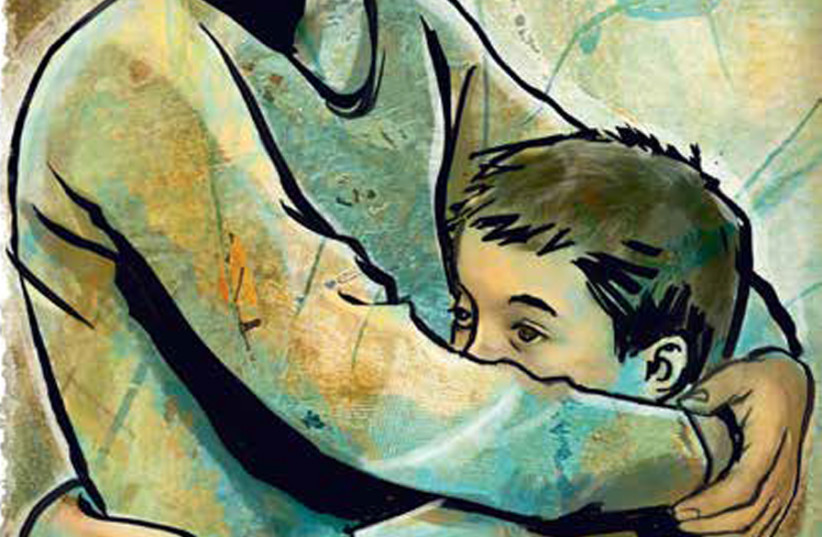You need to talk to your child about sadness. Here's why

Many parents don't enjoy talking to their kids about feelings such as sadness or fear, but ignoring these emotions won't make them disappear.
Recently, a lovely mom and dad came to my clinic. They told me that whenever they feel their daughter might be sad or disappointed about something, they immediately try to distract her from it, whether it's by buying something she wants or doing something fun.
Now they found out that the girl's good friend's mom is dying, and they don't know how to talk about this with their daughter.
How scary is it for us as parents to talk about sad topics like illness, loss, death and suffering in general?
Many parents avoid talking to their kids about these issues because they want to keep and protect them from a complex and difficult reality that suffering exists in the world and that there's a lack of justice.
As parents, we want to prevent our children from feeling worry, from difficult challenges and sorrow. But it's important to remember that suffering, sadness, fear and anger are an integral part of our lives, and it's good for us to know how to deal with these feelings and not ignore them.
Ignoring doesn't make our thoughts and feelings disappear, but the opposite: the more we try to ignore, the more intense they'll be.
It's crucial to know that the imagination and thoughts of our kids work overtime, and when they notice things that aren't discussed they may have feelings of confusion, guilt, anxiety and shame. In their minds, the situation is worse than it is and might be their fault.
They're left with their questions, doubts and fears alone, and the hidden message is that there are things they can't talk about with their parents. Parents need to think about another message we want to convey to kids, one of openness, honesty and emotional resilience.
Even with difficult, unpleasant and sad things, parents must let kids know they're here for them. Tell kids that they can talk to you about anything even if it's very sad, angry, awkward, embarrassing, etc.
Sadness, like all our emotions, has a role. Parents need to remember this. The role of sadness is to motivate people to find encouragement, support and comfort in someone who cares about them. Sadness lets us know that there's something that needs our attention, to tell other people that we need warmth, kindness and love.
Sometimes our kids, like us, are tempted to fight off their sadness, repress it, push it away, cover it with another emotion like anger, or pretend it doesn't exist. But the catch is that the more we try to ignore our emotions, the stronger they'll be.
Give feelings a name
Parents should validate their kids' emotions and be empathetic towards them. We're often tempted to change the situation, to encourage kids to quickly leave sad emotions behind. We need to tell kids that sadness is a natural and healthy emotion. Sadness is how we sometimes adapt to a new reality, and it's a very important emotion.
In the case presented earlier, the parents constantly tried to distract their daughter via rewards so that she wouldn't feel sadness, disappointment or frustration, etc. But it's better to pay attention to the emotion, label it, know how it feels, what feelings it causes, and tell kids that they can handle emotions and we're there to support them.
Also, sentences like, "I don't want you to be sad" or, "Don't be sad" convey a problematic message which is that unpleasant feelings should be kept away and avoided and that it's bad to be sad. We need to let kids know that sadness is a part of our lives, and give the emotion a place.
It's important that our kids see us feeling these difficult emotions, and show that we know how to manage them. This will help them normalize their experience and feel safe to talk about what they're experiencing. Remember that sometimes there's a great loss and it's impossible to change the situation. Tell kids this happens and you're there for them with support and love.
Tali Sterm is a therapist in a clinic for cognitive-behavioral therapy (CBT) who treats anxiety and phobias.
Jerusalem Post Store
`; document.getElementById("linkPremium").innerHTML = cont; var divWithLink = document.getElementById("premium-link"); if (divWithLink !== null && divWithLink !== 'undefined') { divWithLink.style.border = "solid 1px #cb0f3e"; divWithLink.style.textAlign = "center"; divWithLink.style.marginBottom = "15px"; divWithLink.style.marginTop = "15px"; divWithLink.style.width = "100%"; divWithLink.style.backgroundColor = "#122952"; divWithLink.style.color = "#ffffff"; divWithLink.style.lineHeight = "1.5"; } } (function (v, i) { });

